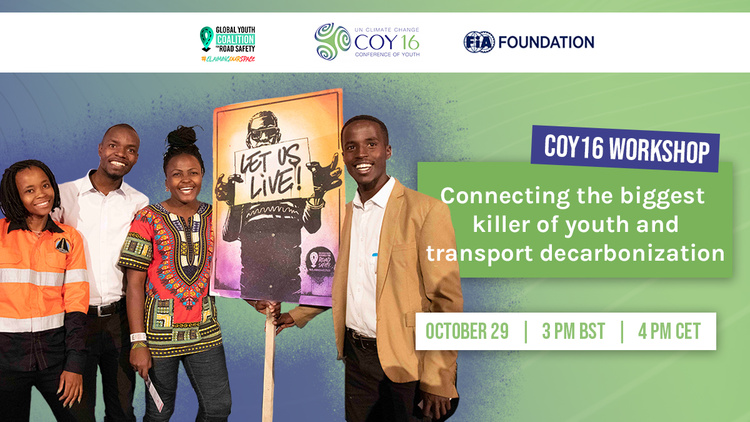The Global Youth Coalition for Road Safety along with FIA Foundation is leading a workshop during the UN Climate Change Conference of Youth (COY16) which connects road safety with transport decarbonization. The workshop, titled “Connecting the biggest killer of youth and transport decarbonization” will be held virtually this coming Friday, 29 October, at 3 pm BST or 4 pm CET on COY’s digital platform.
The Conference on Youth COY16 is an event under the banner of YOUNGO – the Official Youth Constituency of the United Nations Framework Convention on Climate Change (UNFCCC). It provides young people with opportunities for capacity building and policy training as a form of preparation for COP26. The conference gathers youth from around the world to raise their voices and bring them to the UN Climate Negotiations. For the first time, road safety and sustainable transport are given a focus.
The workshop will reiterate points on how transportation and mobility connect with climate by focusing on transport decarbonization. Decarbonization is the reduction of carbon which will result in more efficient consumption of energy. Thus, in turn, will support the creation of cleaner, healthier, and more livable cities.
Speakers of the workshop will also explain how an equitable transport system will maximize the physical and mental health benefits for local and global communities. They will also demonstrate the link between decarbonized transport, road safety, and minimizing pollution.

Key outcomes
The workshop will equip participants with key data and policy requests to use with government representatives and stakeholders at the Conference of Parties (COP26). This will help them advocate for the safety and inclusiveness of transport decarbonization in climate change mitigation and agenda adaptation through meaningful youth engagement.
COY16 will run from the 28th to the 31st of October. The second day will feature workshops on politics and policymaking, partners, goals and youth activism, climate finance, climate justice, human rights & wellbeing, mobility & transport, climate change future scenarios, and wildlife & environment conservation.

